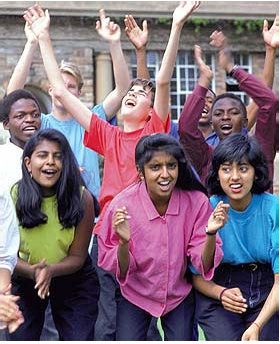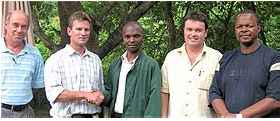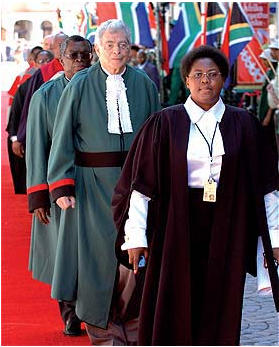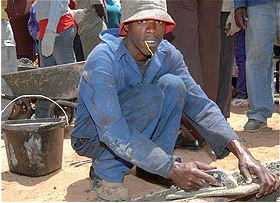 Watching the news, we have heard President Thabo Mbeki talking about 'social cohesion.'
Watching the news, we have heard President Thabo Mbeki talking about 'social cohesion.'
The meaning behind the president’s words is that South Africans should work together to better their lives without letting themselves be divided by race, sex, culture and religion.
National Identity
Social cohesion also means South Africans should stand together to reach a positive common goal. It requires us to see ourselves as one and to have national pride.
The social cohesion idea challenges South Africans to take part in government's efforts to fight poverty, strengthen the family unit, create jobs, support democracy, fight crime, fight HIV and Aids, increase the number of skilled workers, grow the economy and respect the rule of law.
No Violence
Government campaigns which mobilise people to fight violence and abuse against women and children, are meant to restore good family values. They also aim to encourage members of families and communities to report incidents of abuse to the police.
The involvement of the public in such campaigns will help government to deal with the evil of domestic violence and abuse.
Calls have been made by government leaders especially the Minister of Safety and Security, Charles Nqakula, to communities to report criminals. Criminals live among us within our communities.
Government has taken the lead in starting structures like police community forums, which encourage communities to work with the police in fighting crime.
Respect Rights
Social cohesion means people should respect each other’s rights. Government has created special courts like the equality courts in an effort to end discrimination.
Business
To achieve equality within business, government has provided guidelines and a number of partnerships between different racial groups.
Black Economic Empowerment, for example, has helped those from previously disadvantaged backgrounds to start and develop successful businesses.
Social cohesion includes offering South Africans a say in the running of the country through the Izimbizo programs.
Social cohesion can further be seen in how sports events and national celebrations bring people together.
These celebrations speak of the rising South African identity which is expected to blossom further during the Soccer World Cup in 2010.
- Muzi Mkhwanazi
Key elements of social cohesion
 A society in which everyone:
A society in which everyone:
-
Respects the law
-
Respects one another's human rights and values
-
Shares a commitment to keep social order.
-
Government's, land redistribution programme, brought the Mapulana people of Mpumalanga land to create a better life for the community. They were given a large area of land in the fertile Hazyview region. But at first, they lacked the skills to make a profit from the land.
Biggest Claim
-
Their claim on the farm 'Sandford' is the second biggest land claim in the province and is valued at R23,4 million. In addition to Sandford, the community’s land includes 26 other farms.
Secretary of the Sandford Trust, Riebs Khoza, said they were grateful to government for giving them the land and letting them fend for themselves.
Destiny
"Government really helped us by leaving us alone after having bought the land back on our behalf," he said
By leaving us alone government has done us a big favour, Khoza said, "It has allowed us to follow our own destiny as a tribe."The destiny that Khoza speaks about relates to different racial groups working together for the benefit of the country. This means forming working relationships where everyone benefits.
An example is Tembi Lodge, which is situated on Sanford farm. It was run by the community from 2003, but became rundown.
Thanks to an agreement with the Hallow Group of investors worth R22 million, the Mapulana community will be able to restore Tembi Lodge to its former beauty. The lodge will be turned into an 80-bed hotel with a convention centre that can accommodate 300 people.
Jipsa
Khoza said the deal would also put into practice government’s Joint Initiative for Priority Skills Acquisition (Jipsa). In line with the partnership, the Hallow Group and the University of Johannesburg,
plan to build a hospitality industry school at the lodge where community members can study and learn new skills relating to tourism.He said if the people got the necessary knowledge and skills they could turn the lodge and the surrounding land into a successful tourism business.
Good Example
Chief Executive Officer of Hippo Hallow Hotel, Jack Brotherton, said the partnership was a good example of the ideal of social cohesion with different groups working together for the benefit of all. - Muzi Mkhwanazi.
- Muzi Mkhwanazi
"Government helped us by leaving us alone after having bought the land back on our behalf"
For more information, call 1020
 SOCIAL COHESION
SOCIAL COHESION
EQUALITY FOR ALL
Government is doing all it can to treat all South Africans equally.
But, even so, all of us must make sure that government really does do what it should. To do this, people have the law on their side and can take cases of discrimination to the Equality Court.
Laws
A number of laws have been passed to protect our rights and make sure that we treat each other with respect in line with our Constitution.
One of these laws is called the Promotion and Prevention of Unfair
Discrimination. It helps prevent people treating each other badly as was the case during the apartheid years. Whether you are black, Indian, coloured, or white, this law protects your right to be treated with respect.
Equality Courts
To deal with cases of discrimination, government created equality courts in line with the Prevention of Unfair Discrimination Act.
These courts deal with cases in which people discriminate against each other or hurt each others feelings based on things like race and culture, disability, sexuality, language, religion and age.
Government has so far created 220 equality courts throughout the country. These courts are in the same buildings as magistrate 's courts.
Easy Access
Head of the equality courts in Gauteng, Vincent Ratshibvumo, said these courts are easy to access. He said a person with a complaint must inform the clerk of the equality court about the complaint. The case will be registered and the hearing will be very informal.
"A person who approaches the court does not need a lawyer and is not expected to follow any legal rules," Ratshibvumo explained. But a person who brings a complaint to the court must be able to prove that he or she has been treated badly or discriminated against, he said.
Apology
The court has the power to order the guilty party to pay the complainant a sum of money or force a public apology.
The courts can decide what amount the guilty party must pay.
Disabled
Disabled lawyer, Esthe Muller, used an equality court to make sure that her rights and those of other disabled people were respected.
Through the court, she managed to convince the Department of Public Works to build ramps to make it easier for disabled people to access government buildings.
Muller said she is happy that in the past two years going to court had been easier because of the ramps and lifts. It not only makes her life easier, but also the lives of other disabled people.
- Muzi Mkhwanazi
For more information about equality courts, call 1020
 SOCIAL COHESION
SOCIAL COHESION
GAINING SKILLS, FIGHTING POVERTY
One of government's main programmes to fight poverty is the Expanded Public Works Programme (EPWP).
The EPWP is a national programme run by the Department of Public Works. It creates temporary job opportunities for the unemployed, while ensuring that they gain skills through training on the job.
Halving Poverty by 2014
As part of government's programme to fight poverty and halve unemployment by 2014, the EPWP is divided into four categories:
-
Infrastructure;
-
Economic;
-
Environment; and
-
Culture and social.
The infrastructure section deals with creating more labour intensive work. This includes work on projects like road construction and storm-water drains where people use their hands instead of machines.
Access Roads
Head of the section, Maikel Lieuw Kie Song, said their biggest project this year is the called Access Roads Project.
This is a project that employs people to work on roads that connect residential areas to main roads.
An amount of R3 billion has been budgeted for the next three years. The project was started in May and is carried out by provinces
as part of the EPWP.
"We are estimating that 60 000 jobs will be created during the construction of access roads and another 40 000 jobs for maintenance," Kie Song said.
Businesses
Economic sector director, Carmen-Joy Abrahams, said the economic sector focuses on developing work opportunities through helping businesses.
The economic sector’s main programme is the Venture Learnership
Programme.
Under this programme there are programmes like the New Venture
Creation Learnership. The Learnership develops small businesses
in areas like wholesale, electrical, building and construction, events management, information technology, pest control and cleaning services.
A total of R9 million has been allocated to train 150 wholesale companies. All wholesale businesses under the Venture Learnership
Programme can get loans through ABSA Bank.
The bank has already given more than 500 of these small businesses overdraft and asset finance facilities.
- Ndivhuwo Khangale
National Youth Service Programme
The Minister of Public Works, Thoko Didiza, last month started a National Youth Service programme. It will employ about 5 000 youth to renovate government buildings. The R140 million programme is a joint initiative between the National Youth Commission and the Umsobomvu Youth Fund. It is part of EPWP. Youth with some experience or interest in fields like building, painting, plumbing, carpeting and brick-laying will benefit.
Call the National Youth Service Programme or other EPWP opportunities on 012- 337 3115/ 012 337 2507 or call 1020



 Facebook
Facebook Twitter
Twitter WhatsApp
WhatsApp